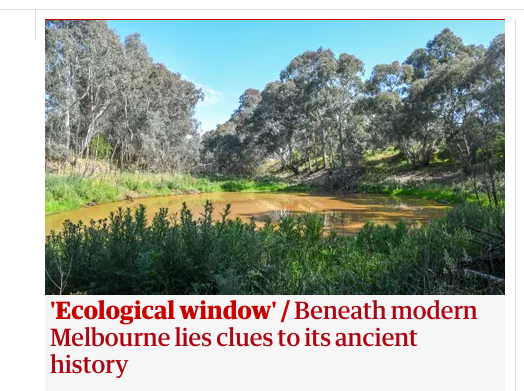Beneath modern Melbourne lie(s) clues
« previous post | next post »
Bob Ladd sent in a screenshot from the Guardian, with the message:
I think this suggests that, except with auxiliary verbs, subject-verb inversion is not really something that is fully a part of English speakers' competence any more. The agreement discrepancy of "clues" and "lies" would be instantly detectable in most other contexts, but not when it's required by residual English verb-second constraints.
He notes that the screen shot came "from first thing this morning UTC, but it was still up and uncorrected at mid-afternoon UTC". And he suggests that things would be very different with a copula or auxiliary verb, e.g. "Beneath modern Melbourne is two of the richest hoards of pirate gold ever found".
I wonder whether there might be a bit of "agreement with nearest" involved — so things would also be different if the initial PP had a plural head, e.g. "Beneath modern cities lies clues to their ancient history".
And of course we need to mention the long-undeserved nickname Grauniad.

Suzanne Valkemirer said,
December 27, 2019 @ 11:05 am
Is that not an example of the phenomenon exempllfied by"There's + singular noun phrase," as in "There's many things I still have to do today"?
Bob Ladd said,
December 27, 2019 @ 6:30 pm
@ Suzanne Valkemirer: I don't think so. "There's" followed by plural seems to be in a class by itself in not requiring agreement. There are/*is plenty of people who could say "There's more potato chips in the kitchen" in informal speech, but not "There is numerous caves in the surrounding hills" in writing, or even "Is there more potato chips in the kitchen?" in informal speech. It's true, though, that the construction with "lies" in the headline is essentially equivalent to "there is", and I can think of other examples where you might find the same agreement issue with other lexical verbs in a hastily written newspaper prose – things like "Behind the rhetoric lurks dangerous echoes of the 1930s" or "In the corner of the gallery stands the terra cotta figures discovered in the recent excavations". To me they sound pretty awful, though, because that construction is fairly elevated style, unlike "There's more potato chips in the kitchen". Even worse is the following sentences: "Over the mantelpiece hangs portraits of their three children" or "To the west of the village looms the cliffs that define the edge of the plateau". (And yes, I just did that on purpose.)
John from Cincinnati said,
December 27, 2019 @ 8:18 pm
I do not know what is above their mantlepiece and I ask "What hangs there?" You reply "Portraits of their three children." I have not been to the village and I ask "So, something looms to the West?" You reply "Yes, the cliffs that define the edge of the plateau." What lies beneath modern Melbourne? Two of the richest hoards of pirate gold ever found.
This seems related to the kerfuffle over "He is one of those who (verb/verbs)." Something about collections of things. In some sentences we are permitted (peeving aside) to choose whether the object is a single entity that happens to be a collection, or the entities implicitly as individuals. The committee (have/has) voted.
Native AmE speaker, not a professional linguist.
Gali said,
December 27, 2019 @ 11:36 pm
@John from Cincinnati Not quite the same thing. "What" and "something" are singular despite that their referent might be expressed with the plural, and it's not ambiguous or otherwise difficult for a native speaker to perceive *What hang on the wall? as non-standard. The difficulty with the given sentence isn't what agreement "clues" or "Melbourne" take (given that most would not struggle with "Clues {lie/lies} beneath Melbourne" or "Melbourne {lie/lies} in the south-east of Australia"), but intuiting what "lies" should agree with.
@Bob Ladd I would put "there's" in the class of contractions providing forms that can't be constructed in standard English, as with "aren't" in "Aren't I?". Other examples that I can think of are more non-standard/colloquial, but sentences like "When's the kids coming?" would presumably belong as well.
Suburbanbanshee said,
December 28, 2019 @ 9:14 am
Or it could just be auto-correct, or an artifact of a previous series of possible headlines that were not approved, or the work of a very lazy editor who doesn't believe in checking his sentences. Or it could even be one of those articles and headlines that are auto-generated by a computer program, and the human editor never bothered to set eyes on any results.
unekdoud said,
December 28, 2019 @ 10:38 am
Since the question of the "there's" contraction is coming up, I'd like to add that "Beneath Melbourne is clues", and even the contracted "Beneath Melbourne's clues", is completely unacceptable to me.
Andrew Usher said,
December 28, 2019 @ 5:34 pm
That contraction would never be acceptable in writing anyway. I think the point that these disagreements become not totally unacceptable when inversion exists, is sound.
"There's" is a special case – "where's", "here's", and for some people others, follow that pattern too, but don't allow inversion. Only "there's" allows inversion and either agreement. But it's possible the headline was originally conceived as
Beneath modern Melbourne, there's clues …
which was changed to something more suitable, but whoever (the original writer or not) did that still missed the agreement problem.
k_over_hbarc at yahoo dot com
Moonfriend said,
December 29, 2019 @ 6:42 pm
Changed now: https://www.theguardian.com/australia-news/2019/dec/26/beneath-modern-melbourne-a-window-opens-into-its-ancient-history
They eliminated the inversion.